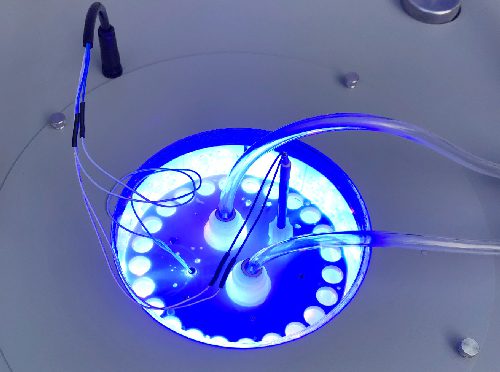

Lucent360™ Case Study:
Scaling Up: 100 mL reaction in the Lucent360™

The following reaction was performed at 100 mL scale (5 mmol) with the Lucent360™ batch reactor (HCK1021-01-007) at 450 nm equipped with nitrogen inlet/outlet ports, a septum for syringing in reagents/sampling and a temperature probe. (see photo above) The reaction is cooled by an external chiller set at 25 °C. For scaling up the reaction, the concentration of the iridium catalyst was reduced by 10% from 1 mol % to 0.1 mol % from the corresponding 2 mL reaction.
Figure 1:

The 100 mL reaction was performed according to the following protocol (Table 1):
In the 700 mL Lucent 360 reactor, was added 54.9 mg Ni-glyme (5 mol %, 250 μmol), 67.1 mg dttbpy (5 mol %, 250 μmol) and 2.44 g Cs2CO3 (1.5 equiv., 7.5 mmol. To the reactor was a 100 mL solution in DMSO containing 0.995 g bromoacetophenone (5 mmol) and 1.63 g Boc-Val-OH (1.5 equiv., 7.5 mmol). 5.61 mg Ir(dF-CF3-ppy)2(dtbbpy) (0.1 mol %, 5 μmol) was added as a 1 mL solution in DMSO. The resulting solution was sparged with nitrogen for 15 minutes prior to turning on the LED’s and with a constant stream of nitrogen during the reaction. The reaction was performed at 30 °C in the Lucent360™ with 5- 450 nm LED modules at 100% intensity. Analytical samples were taken from each vial at 1,2 and 4 hours for analysis by LC-MS (10 μL dilution to 1 mL in DMSO.
At 1 hour, starting bromoacetophenone was completely consumed and 81% of the expected product was determined by LC-MS.
| Reagent | Equivalent | Amount (μmol) | Amount (mol) | 0.001 | M |
| bromoacetophenone | 1 | 5000 | 0.005 | 995.20 | mg |
| boc-Val-OH | 1.5 | 7500 | 0.0075 | 1629.45 | mg |
| Ir | 0.001 | 5 | 0.000005 | 5.61 | mg |
| “Ni” | 0.05 | 250 | 0.00025 | 54.93 | mg |
| dtbbpyp | 0.05 | 250 | 0.00025 | 67.10 | mg |
| Cs2CO3 | 1.5 | 7500 | 0.0075 | 2443.65 | mg |
| solvent | DMSO | 0.05M | 0.1 | L |
Actinometry experiments with 100 ml reaction in the Lucent360™ have determined an effective power of 40 W in the reactor. This corresponds to a photon flux in the reactor at 150×10-6 einstein/s. This value represents 150×10-6 moles of photons per second in the 100 mL reaction.
Based on our 81%, we estimated that 0.004 mol was produced in 60 minutes (3600 s) (1.13×10-6 mol/s) and the resulting quantum yield of the reaction would be 0.007.
